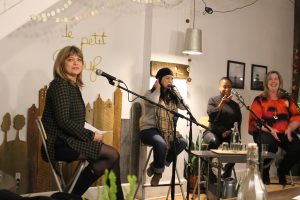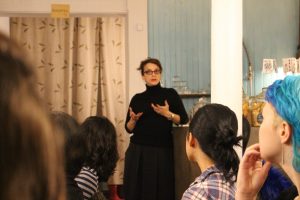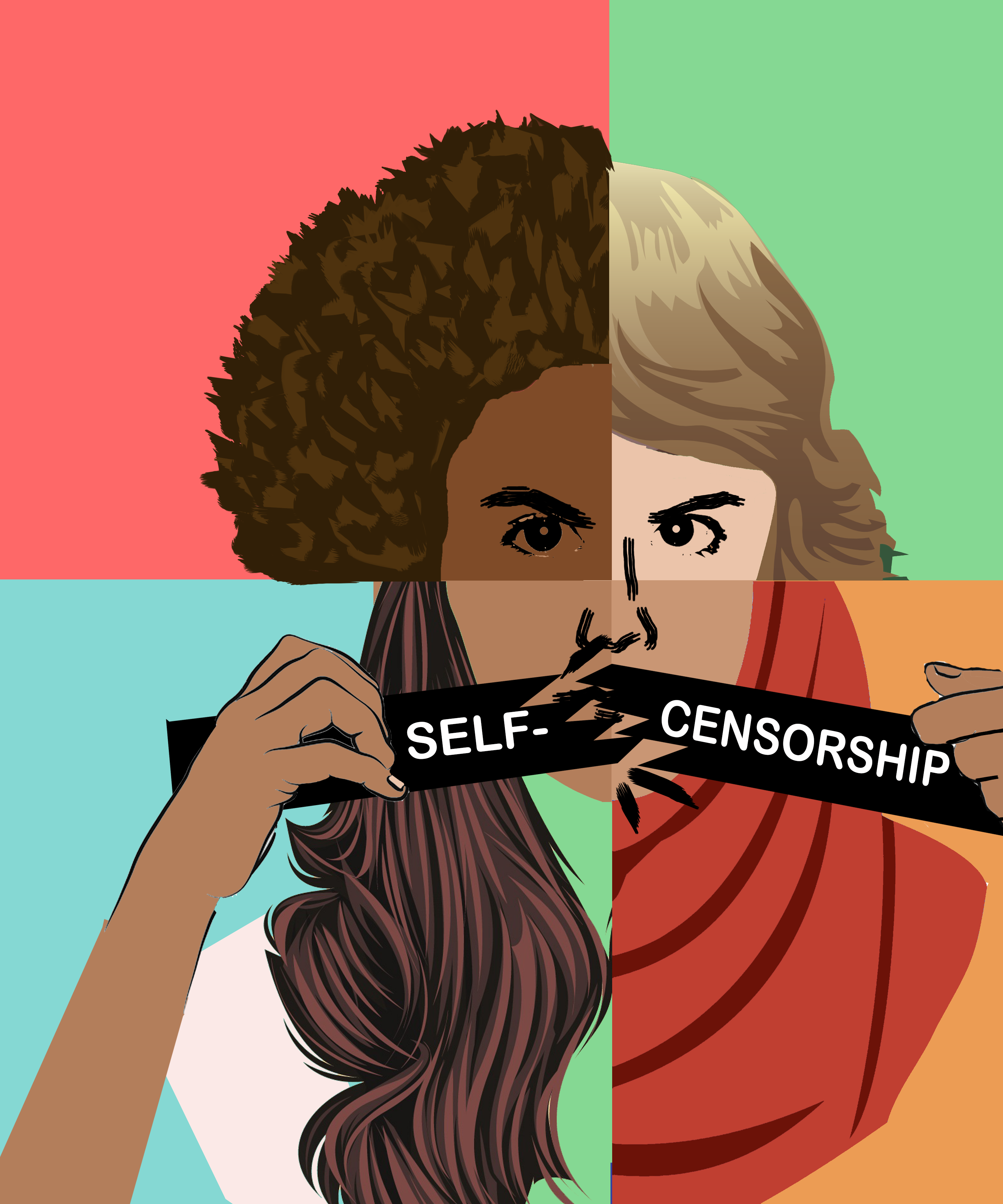Béatrice Media and Imago Theatre organize a panel on women and self-censorship
On the mild and rainy evening of Jan. 11, in Montreal’s Centre-Sud neighbourhood, some two or three dozens of people met to talk about women, self-censorship and change.
The event, titled “Women Talk About Self-Censorship,” was organized in partnership with Béatrice Media, an independent media production company, and Imago Theatre, a theatre company whose mandate is equal representation and feminist storytelling.
The conversation, which took place at Café Sfouf, welcomed three panelists and CJLO radio broadcaster Rebecca Munroe as the host. The event was recorded for Béatrice Media’s podcast, Béacast.

Photo by Danielle Gasher.
“Helpless.” “Weak.” “Small.” “Unempowered.” The evening’s three strong and successful panelists were asked by the host to remember a time when they felt they censored their words. They had to recount how it made them feel in that moment. Luckily for these women, they now rarely feel helpless, weak, small or unempowered.
“10, 15 years ago, I don’t think you were taught to speak about your opinion, empower yourself,” said one panelist, Dominique Pirolo, about her childhood experiences with speaking up. Today, Pirolo is a talent acquisition specialist for a software company in Montreal. She explained her assertiveness developed over time.
The panelists talked about this self-censorship tendency among women, and where they felt it came from. Panelist Tracey Steer, a self-employed writer whose work has appeared in Today’s Parent and Reader’s Digest, believes a lot of it has to do with women’s need to be people-pleasers. “It’s not always a bad thing. But, it’s not always a good thing,” said Steer. “And it takes a while, I think, to undo—not just being pleasing, and not just trying to keep everyone else around you happy.”
For panelist Christina Vroom, the associate director of university advancement for McGill University’s faculty of dentistry, assertiveness came in her adult life.
“I grew up with two brothers and a mother who was very opinionated,” she said. “She was my hero. I wanted to be like her, but I often felt I couldn’t contribute on the same level. There was a feeling of, ‘I’m going to disappoint.’” Vroom explained she used to feel the need to keep the peace and balance out the big opinions and personalities already present in her household. Today, Vroom says she has “no problem rocking the boat.”
The panelists addressed the double-standard they feel is present when women demonstrate assertiveness.
“When I became much more assertive with myself and not shy, a friend of mine said to me, ‘You’ve become very aggressive.’ I said, ‘I think you mean assertive.’ And he said, ‘No, no, aggressive,’” Vroom recounted, as the crowd ooh-ed and ahh-ed in disbelief . “He said to me, ‘I think that’s why you’re single.’ I said, ‘I think that’s why we’re not going to be friends anymore.’”
Steer addressed how people tie the identifier “bitch” to women who are simply demonstrating confidence. “That’s the thing, you know, because you don’t want to be seen as a bitch. Men are assertive and women are bitchy,” said Steer.

Photo by Danielle Gasher.
In the “talk-back” period of the discussion, the period when the podcast stopped recording and the discussion opened to the audience, a larger conversation about action and change took place. Audience members brought into question larger societal problems, such as the patriarchy organization in North America and gender inequality in the workplace. Together, the audience, panelists, host and Béatrice Media co-founder, Adriana Palanca, brainstormed ideas for promoting change and being the change. “It can start with education and really teaching younger people about it. And empowering young girls. And teaching men that it’s okay that women have a voice,” said Munroe.
Pirolo, who hires people as a large part of her job, had some advice for women seeking employment. “I noticed that when I’m hiring and interviewing individuals, and I interview men and I interview women, the women are not selling themselves the way they should,” said Pirolo.
According to a 2012 study conducted by Brigham Young University and Princeton University researchers, men dominate conversations during business meetings. The study found women only spoke 25 per cent of the time in meetings, with men speaking 75 per cent of the time. According to research conducted in 2013 by a data tool called Twee-Q, women make up 62 per cent of Twitter users. However, Twee-Q’s stats found that men are retweeted almost twice as often as women, with almost 63 per cent of all retweets belonging to men.
Palanca said she and Mireille St-Pierre founded Béatrice Media to reinforce feminism in media organizations and to start conversations about women, equality, social progress and empowerment.
“[Béatrice Media’s] version of feminism, at its most basic, is: ‘I want to be able to do what a dude does and not get judged for it.’ That’s it, right? And, for us, we weren’t seeing that reflected in a lot of the media that we saw around us. And we said, ‘This is what we feel, this is what we want to see reflected,’” Palanca told The Concordian.
Palanca said she was happy with how the evening unfolded and looks forward to doing similar events in the future. She described the talk as a test-run. For Palanca, good, progressive conversation is about “cutting through the judgement, cutting through the habitual behaviour, cutting through the bullshit.”




